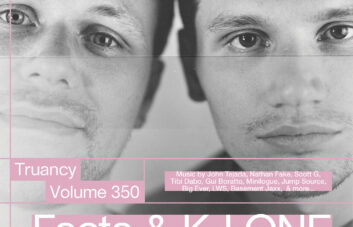Starting off as Cong Burn Waves, a tape label and collective loosely based across the north of England and Glasgow, Cong Burn provides us with its first 12” in the form of a four-track-four-artist split release. Championed by the likes of Ben UFO, Jane Fitz, Steve Davis, Tasker and Lee Gamble (the latter two having picked up label artist Lanark Artefax for their respective Whities and UIQ labels), they certainly already have their fair share of fans.
The opener, Haddon’s “Not Coming To The Club” is a blitzed out ode to staying in. It’s a delightful splash of prime material for those introspective summer evenings. Howes’ “Untitled” delves into the weirder realms of electro. The discordant bells and squelches give it a sense of exploration through something akin to a digital rainforest. It’s the most leftfield track on the record, drawing parallels between itself and the album tracks of Call Super and Objekt. L. Pearson’s gorgeous “PSR1170” also has electro tinges underneath its laid back humidity, tying together motifs seen throughout the record. The releases finishes with some fresh faces on Cong Burn. You may already be familiar with Perfume Advert, whose releases on Opal Tapes and 1080p – two high-quality labels with extensive back catalogues – have been amongst the strongest releases on both. “Dyn Horizontal Multiburst” continues their tradition of hazy, dubby house to round off a strong start to this chapter for Cong Burn.
Club Late Music is an ‘open-source’ music collective whose aim is to create a global URL nation, uniting artists and music producers. Hosting events in London, Paris and Tokyo, on top of working with artists worldwide, their latest project is the G.U.N compilation. In this release, Club Late Music invites sounds from the likes of Blastto, WRACK and Mstk to explore diversities in club music. Despite G.U.N opening and closing with fast-paced tracks from Kid Cala and Adel Faure, there is a clear theme of variation within the project. We see Ultramiedo embarking on a dark and slightly mysterious route in “Yolo”, whereas Lyzza offers a playful and dance-influenced track, “Give It To Me (1990lick)”. Each song carries its own unique sound, yet G.U.N presents a well-connected selection of pieces.
Baltimore four-piece Horse Lords have an immediate, understated sort of charm about them. Their 2016 album Interventions bursts into a flavourful groove straight from the off and their stage presence is an endearing mix of awkward casual. News that the avant-rockers had covered music from minimal virtuoso Julius Eastman (whose incredible works are experiencing a second life long after the composer’s death) would turn out to be a perfect pairing, demonstrated by a video of the band performing “Stay On It” at Björk’s supposed house. The cover was released as Side A of their Mixtape IV on Northern Spy Records, purveyors of all things rhythmically entrancing, from Zs and the Necks to Ravi Shankar.
Fellow Baltimorean Abdu Ali introduces Horse Lords’ “Stay On It” with spoken word on the recorded version, riffing on the title theme in rhymes over background humming. Eastman’s chirping motif for the song is translated into start-stop saxophone and bass as the band’s guitar begins to poke out from the sides. Horse Lords’ fluid, mathy grooves and uncanny ability to sound both as one and many at will are on show. Freewheeling sax, experimental breakouts and a desert-dusk outro also come as part of the package. Side B on the tape houses “Remember The Future”, an original work from the band. Introduced as a “sound and voice collage”, it features chants from the Women’s March on Washington earlier this year over percussion, drone sequences and twinkling, abstract electronics. Its most memorable passage is the tennis rally of vocals between sound artist Bonnie Jones and the band’s drummer, Sam Haberman: “Ten thousand workers to Chipotle for unpaid wages. Heroin epidemic. Anthony Weiner texting, yet again.” “Test.” “Ten-four.” “Have a great day, guys.” “Fuels.” “Are the Horse Lords for sports?” “Two.” “Four.” “System.” “Time.” It’s a clear, perfectly understandable stream of data, too nonsensical to be considered information, too rapidly received to process and too dynamic and engaging to tear your ears away from in the moment.
Words by Antoin Lindsay, Michelle Ulor and Tayyab Amin.




